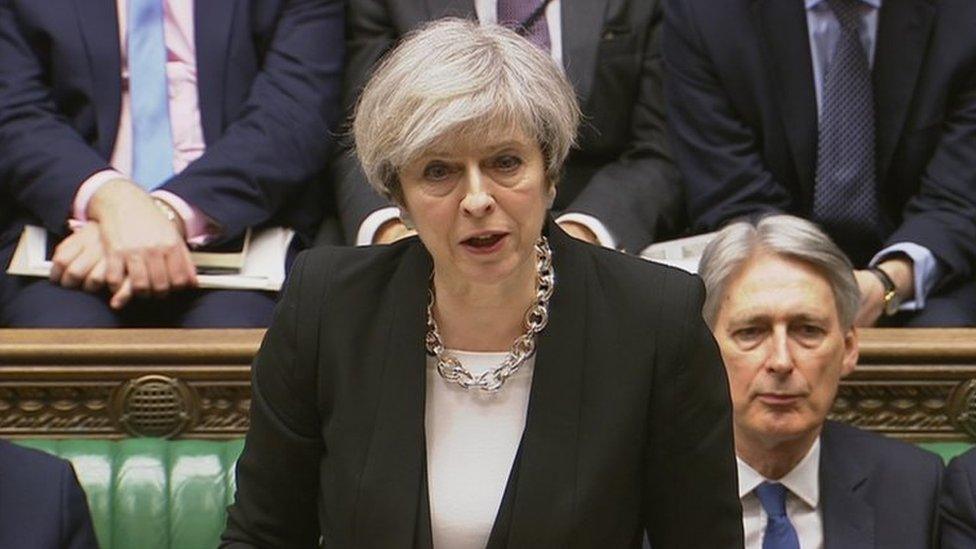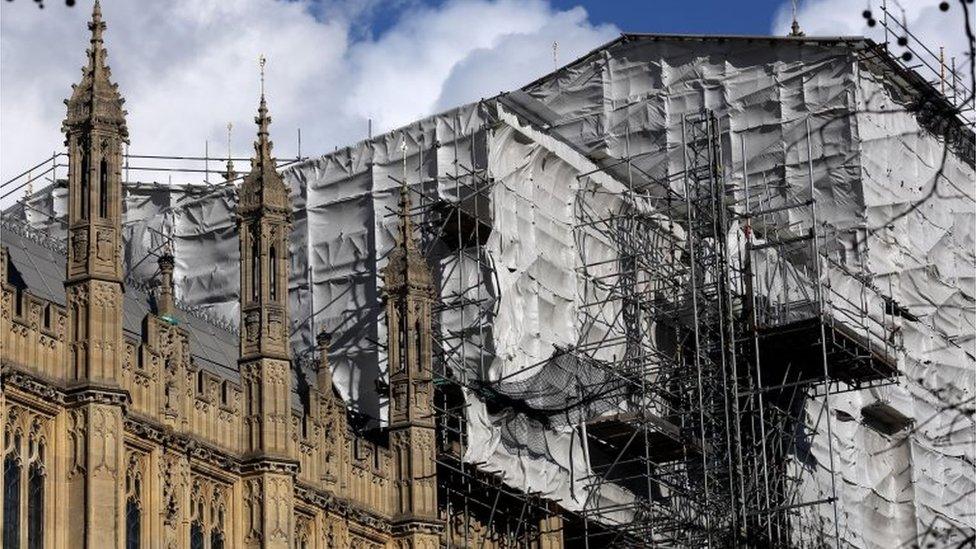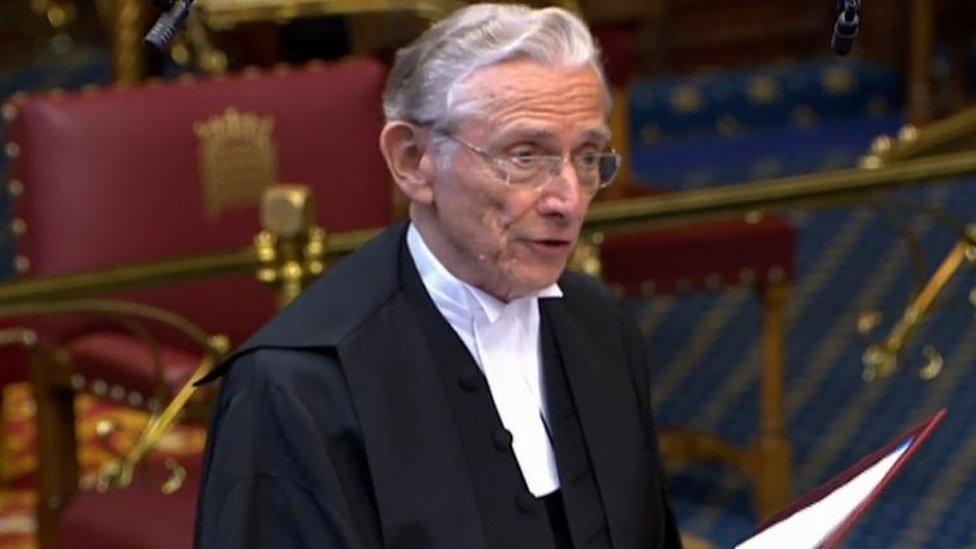Week ahead in Parliament
- Published

Theresa May remembered the victims of the attack, and expressed MPs' thanks to those who work to keep Parliament safe
After a traumatic week, it is likely that some of the most significant events in Parliament next week will be statements and questions following up Wednesday's terrorist attack.
The prime minister, of course, made a statement to MPs the day after the attack, and expressed MPs' gratitude to the staff and security teams who guard the Palace of Westminster. There will be many acts of remembrance in the days ahead, while parliamentarians get on with the day-to-day business of democracy.
So watch out for statements around the triggering of Article 50, the formal process for Britain's divorce from the EU, and on the expected vote in the Scottish Parliament, calling for a second independence referendum.
Elsewhere, there's an increasingly fag-end feel to the parliamentary business, with much tying-up of legislative loose ends, as the end of the parliamentary year looms.
One event that's not on the agenda is the long-awaited debate on the plan to move MPs and peers out of their iconic Victorian building to make way for a £4.3bn (at a minimum) restoration and renewal (R&R) project, external.
I'm told this had been pencilled in for Thursday 20 April, until objections were raised that many MPs might be absent and that might allow opponents of the plan to pass an amendment blocking it.
In any event, the proposed motion would simply have authorised a further detailed study, albeit at a considerable cost, plus, without committing Parliament to go ahead.
And meanwhile the entertaining spat across the committee corridor continues, with the Treasury Committee seeking to give the definitive ruling on the R&R scheme, trumping an inquiry by the Public Accounts Committee. PAC hackles have been raised by a hostile account of their inquiry in the pages of the latest Private Eye. Expect a few punch ups in the Commons bike-sheds, if this kind of thing continues.

Update: On Wednesday in the Lords, there's a bit of legislating to do, with the third report stage day of the Digital Economy Bill (displaced from last week because of the terrorist attack) - followed by a motion to approve the Horserace Betting Levy Regulations 2017. Labour's two motions on the process of Brexit have been postponed until Tuesday 4 April.
Monday
The Commons opens (2.30pm) with Work and Pensions questions - and watch out for any urgent questions or ministerial statements at 3.30pm.
MP then move on to the report stage and third reading debates on the Bus Services Bill, external - there are a number of interesting amendments. - the Lib Dem John Pugh has two calling for concessionary bus travel for 16 to 18-year-olds in apprenticeships and full-time education.
And Labour are calling for a 10 year national strategy for local bus services - but the big battle looks to be over a Labour proposal to delete clause 22 of the bill, which aims to ban local councils from forming their own bus companies.
In Westminster Hall (4.30pm) there's a debate on e-petition 165672, external on ending the badger cull. The petition says that, since 2013, thousands of badgers have been killed in a government cull attempting to control bovine TB. Against scientific advice and before a four year trial has completed, the government is now expanding the cull to new counties - tens of thousands of healthy badgers could be killed. The petition has attracted 108,319 signatures.
My committee pick is the Joint Committee on National Security Strategy inquiry (4.15pm) into Cyber Security: UK national security in a Digital World, external, where the inquiry kicks off with witnesses from PricewaterhouseCoopers, Nettitude, the NCC Group and Cardiff University.
In the Lords (2.30pm) the main event is report stage consideration of the Technical and Further Education Bill - there are lots of amendments down dealing with such subjects as requiring a report on quality outcomes of completed apprenticeships, financial support for students undertaking apprenticeships, and establishing an apprenticeship helpline,
The dinner break business is a regret motion from Labour's Baroness Sherlock on a Statutory Instrument on the Personal Independence Payment, focusing particularly on fears that the regulations would discriminate against people with mental health problems and put vulnerable claimants at risk.
Labour are planning to push this to a vote. There is also a fatal motion from the Lib Dems, on which Labour plan to abstain.
Tuesday
The Commons begins (11.30am) with Foreign Office questions, after which the Conservative Suella Fernandes has a Ten Minute Rule Bill calling for enforcement of Child Arrangement Orders in contact disputes.
She says there is a real problem of resident parents breaching judge-made contact orders with impunity - she wants better enforcement, because the consequences can be devastating: "In the worst cases, a non-resident father might be denied access to his child for several years with his only option being to spend huge amounts of money in the courts with little guarantee of a fair outcome. Children have the right to a meaningful relationship with both parents upon divorce but the law does not currently enable this to happen because of a failure to crack down on parents who breach, a criminal threshold for contempt which is rarely met and an inability to assert its authority. I would advocate a 'three strikes' approach where residence (if safe) should be transferred, so that a strong message is sent that Child Arrangement Orders are mandatory, not optional."
She also argues for a presumption of shared parenting - a meaningful relationship between the child and both parents, as far as is practicable (and as long as the safety/welfare of the child is not put at risk) should be the starting point for determining the residence and contact with a child upon a divorce. Currently, the law only provides for "parental involvement… direct, or indirect", which can amount to a birthday card or Christmas card every year.
Then MPs deal with Lords amendments to the Neighbourhood Planning Bill, external - the government lost a vote in the Lords on regulations to remove building owners' existing rights to change the use of, or to demolish, drinking establishments without planning permission - will the government seek to overturn it?
Next comes a general debate on the conflict in Yemen. And the adjournment debate, led by the SNP's Hannah Bardell, is one health and safety in the mining industry.
Events in Westminster Hall include debates on preventing avoidable sight loss (9.30am-11am) led by the Conservative Nusrat Ghani who's Chair of the APPG on Eye Health and Visual Impairment, on the prevention of avoidable sight loss. There are almost two million people in the UK living with sight loss, and this is predicted to double to around four million people by 2050, in part due to our ageing population.
It's estimated that 50% of sight loss incidences are avoidable. Despite the high occurrence of sight loss, there is no overarching strategy in England to govern it, in contrast to the strategies that exist for hearing loss and dementia. Eye care strategies do exist in Scotland, Wales and Northern Ireland. Ms Ghani will be asking for a strategy to support prevention and care in England.

Royston Smith is seeking a memorial for the Spitfire in Southampton
The Conservative MP, Royston Smith, will be seeking funding for the National Spitfire Project, external - a scheme for a memorial to the iconic World War II fighter in Southampton. Supermarine, the company which created the Spitfire, was based in the city, and its factories were targeted by German bombers. Mr Smith is seeking £4m from the LIBOR fund, the money collected in fines for interest rate manipulation, and held by the Treasury, so that a highly visible memorial can be placed on Southampton's waterfront (2.30pm - 4pm).
Finally (4.30pm- 5.30pm) the Conservative Ben Howlett leads a debate on Implementing the UK Strategy for Rare Diseases - the government published its Rare Diseases Strategy in 2013 and the All Party Parliamentary Group for Rare, Genetic and Undiagnosed Conditions have since held an inquiry into how the strategy is working. It found that the government needs to introduce an implementation plan in England. The minister has already said this is a personal priority for her and Mr Howlett hopes to hear more about how she intends to do that.
In the Lords, (2.30pm) peers debate the detail of the Preventing and Combating Violence Against Women and Domestic Violence (Ratification of Convention) Bill , external- which would move the UK towards putting the Istanbul Convention into UK law. Then they turn to their first day of committee stage debate on the Criminal Finances Bill, external, where the key issues include the Proceeds of Crime Act, Unexplained Wealth Orders and suspicious activity reports on money laundering.
During the dinner break there will be a short debate on the maintenance of the UK's world-leading position in medical research, led by the Lib Dem peer Lord Sharkey, who fears it may be under threat after Brexit.
Wednesday
MPs open (11.30am) with International Development questions, followed, at noon by Prime Minister's Questions.
Next comes a Ten Minute Rule Bill from Labour's Andy Burnham, who's contesting the newly-created Greater Manchester mayoralty.. He is proposing the Public Authority (Accountability) Bill - aka the Hillsborough Bill - which has cross-party support. It will require public bodies and individuals to carry out their functions in the public interest, including assisting courts, official inquiries and investigations. It creates new offences for the breach of these new duties, and it seeks to provide parity of funding at inquests and other inquiries for victims and their relatives. Mr Burnham pushed for the second Hillsborough Inquiry, which revealed the extent of evidence-tampering and led to a new inquest finding that the victims of the disaster had been unlawfully killed.
That is followed be detailed report stage debate on the Pension Schemes Bill,, external a relatively uncontroversial measure which focuses on master trust occupational pension schemes, and then its third reading.
In Westminster Hall, MPs debates include schools funding in London (10.30am -11am); the All Party Group report Impact of Health and Social Care Act on HIV treatment (2.30pm-4pm), and finally the Conservative Kelly Tolhurst leads a debate (4.30pm-5.30pm) on the need for a "Breathing Space" scheme to help families in debt - this follows from her private member's bill which aimed to create a statutory breathing space of up to a year (more usually six months) in which families which run into trouble can have their interest payments frozen, and where bailiffs would not be sent in.

One debate missing from the week's debates is a discussion on the renovation of Parliament
This would take the pressure off and allow their debt to be restructured with a debt advisor. The plan is modelled on the DAS Scheme in Scotland, which has reduced bankruptcy there: the creditors still get their money but the collateral damage is much reduced. She believes this plan fits into the prime minister's agenda to help struggling families.
My committee pick is the Education and Health hearing on children's mental health (9.30am). Witnesses include Natasha Devon, former government mental health champion and founder of Self-Esteem Team, and Ministers Edward Timpson and Nicola Blackwood. The committees will also hear from Lord Layard, who is advising the government over its trial of weekly mindfulness classes in schools.
In the Lords (3pm) watch out for a question from the Lib Dems former election supremo Lord Rennard on reviewing legislation concerning spending rules in elections and referendums - he will raise the issue of alleged lack of clarity in what is national and what is local spending and how the principles of the 1883 legislation to prevent buying of constituencies has been effectively overturned.
There's a bit of light legislating to do: the third reading of the Digital Economy Bill , external- followed by a motion to approve the Horserace Betting Levy Regulations 2017. But the main event will be Labour's two motions on the process of Brexit: first their Brexit spokesperson Baroness Hayter wants a report by the end of this session on the progress made towards ensuring that qualifying non-UK European Economic Area nationals and their family members are able to retain their fundamental EU-derived rights after the UK has left the EU.
Then the Labour leader Baroness Smith of Basildon will propose the creation of a Joint Committee of Lords and Commons to consider and report on the "terms and options for any votes in Parliament on the outcome of the negotiations on the UK's withdrawal from the EU, including how any such votes be taken before any agreement is considered by the European Parliament; and that the Joint Committee do report by 31 October 2017." (See my earlier blog on this).
Thursday
The Commons gathers (9.30am) for Transport questions, after which the Leader of the House, David Lidington will set out the Commons agenda when MPs return after Easter.
Two debates chosen by the Backbench Business Committee follow, the first is on animal welfare, where Neil Parish, the Conservative Chair of the Environment, Food and Rural Affairs Committee will lead, dealing with their report on the welfare of domestic pets, external. A particular concern is conditions on puppy farms. Then MPs have their traditional end of term debate when MPs can raise any subject they choose.
The final event of the day will be an adjournment debate on the affordability of sanitary products - led by the Labour MP Paula Sherriff, who has successfully campaigned against VAT on them.
In Westminster Hall (from 1.30pm) there's a backbench debate on the future of local and regional news providers.

Peers do not want to see the Lord Speaker, Lord Fowler, taking on the same role as John Bercow in the Commons
In the Lords (3pm), there's a blizzard of orders and regulations to be voted on - followed by a short debate on reviewing the role of the Lord Speaker, led by Labour's Lord Grocott, who wants to end the situation where the government Front Bench, usually the Leader of the House or the chief whip, decides which peer should speak next.
Peers are very reluctant to see their Lord Speaker - a post only created in 2006 - evolve into a Commons-style Speaker, bellowing Order! Order! at the House, but there has been an increasing problem with competing peers vying for the floor and trying to speak over one another.
Neither House sits on Friday - MPs will return after their Easter Break on Tuesday 18 April. Peers won't break for Easter until Friday 7 April.